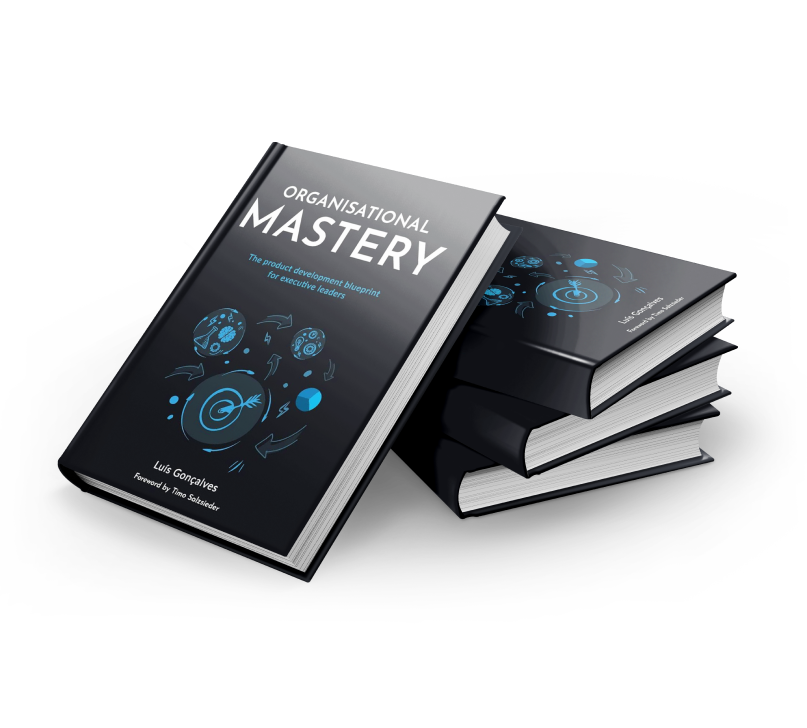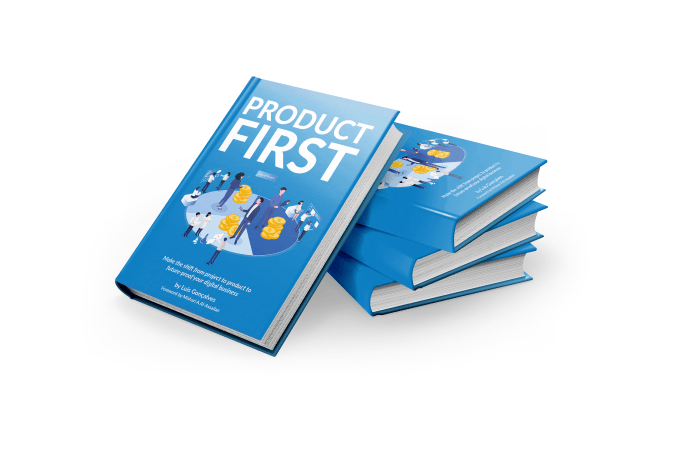Share this
The Importance of a Digital Product Marketing Strategy
by Luis Gonçalves on Jan 13, 2024 5:25:41 AM

The ever-evolving digital landscape has transformed the way businesses market their products. As you navigate the intricate web of digital marketing, understanding and implementing a digital product marketing strategy can make all the difference. But what does a solid strategy entail?
ADAPT Methodology® is a unique Digital Product Development framework to change traditional project-centric companies toward product-led companies!
Society changed and leaders need support in the way how they lead and design their digital product organizations, that is the reason why the ADAPT Methodology® was created, but now let’s get a deep dive into the realms of digital product marketing strategy.
What is a Digital Product Marketing Strategy?
A digital product marketing strategy is a comprehensive, data-driven plan that guides your online marketing efforts to increase visibility, engagement, and ultimately, sales of your digital products. It's not just about selling; it's about creating a valuable and seamless experience for your customers, one that cultivates trust and loyalty.
The Significance of a Strategy: Why is it Vital?
The digital world is vast, competitive, and constantly changing. Without a well-defined strategy, your digital product might simply drown in the sea of online content. A well-crafted strategy ensures that your product is seen, understood, and chosen by your target audience.
Elements of a Digital Product Marketing Strategy
Building a solid digital product marketing strategy isn't a cakewalk. It requires meticulous planning, profound knowledge of the market, and an understanding of your customer's needs and behaviors. Let's delve deeper into the essential elements of a strategy.
Understanding Your Audience: The First Step
The foundation of any successful marketing strategy lies in understanding your audience. What are their needs, preferences, and pain points? What digital platforms do they frequent? The answers to these questions will guide your marketing efforts.
Analyzing the Competition: Learn from Others
No business operates in a vacuum. Analyzing your competitors can provide valuable insights into what works and what doesn't in your niche. Learning from their successes and failures can help you fine-tune your strategy.
Establishing Clear Goals: Know What You Want to Achieve
A clear understanding of what you aim to achieve with your digital product marketing strategy is crucial. Whether it's increasing website traffic, boosting sales, or enhancing brand awareness, having specific, measurable, achievable, relevant, and time-bound (SMART) goals will help steer your efforts in the right direction.
Crafting a Unique Value Proposition: Stand Out from the Crowd
A unique value proposition (UVP) is what sets your digital product apart from the competition. It's a clear statement that explains how your product solves customers' problems, what benefits it offers, and why it's better than the alternatives.
Choosing the Right Marketing Channels: Reach Your Audience Where They Are
Not all marketing channels are created equal. The right channels for your digital product marketing strategy will depend on your target audience, product, and goals. Be it social media, email marketing, content marketing, or SEO, choosing the right channels is key to reaching your audience effectively.
Implementing Your Strategy
With the essential elements in place, you're ready to dive into implementing your digital product marketing strategy. Here's what you need to know.
Creating High-Quality Content: Hook Your Audience
Content is king in the digital world. High-quality, engaging, and relevant content not only attracts but also retains your audience, ultimately leading to higher conversion rates. Whether it's blog posts, videos, or social media updates, your content should align with your UVP and reflect your brand's voice.
Leveraging SEO: Be Found
Search Engine Optimization (SEO) is a crucial aspect of any digital product marketing strategy. By optimizing your content for search engines, you increase the visibility of your digital product to potential customers who are actively looking for what you offer.
Engaging in Social Media Marketing: Connect with Your Audience
Social media is a powerful tool for connecting with your audience. Regularly sharing valuable content, engaging with your followers, and running targeted ad campaigns can significantly boost your product's visibility and sales.
Optimizing for Conversion: Turn Visitors into Customers
Getting traffic to your website or social media pages is just half the battle. You also need to convert these visitors into customers. That's where conversion rate optimization (CRO) comes in. By fine-tuning your website and content based on user behavior data, you can increase the likelihood of conversions.
Monitoring and Tweaking Your Strategy: The Journey Never Ends
The digital landscape is constantly evolving, and so should your strategy. Regularly monitoring and analyzing your strategy's performance will help you identify areas of improvement and adjust your efforts accordingly.
Best Practices
Implementing a strategy is one thing, doing it effectively is another. Here are some best practices for your digital product marketing strategy.
Personalization: Speak Directly to Your Customers
In a crowded digital market, personalization can make your product stand out. Tailoring your marketing messages to individual customers can make them feel valued and understood, increasing their likelihood of choosing your product.
Data-Driven Decision Making: Let Numbers Guide You
Relying on data rather than hunches can significantly improve your strategy's effectiveness. Use data from various sources, like Google Analytics and social media analytics, to make informed decisions about your marketing efforts.
Constant Learning: Stay Ahead of the Curve
Digital marketing trends are constantly changing. Staying updated with the latest trends and adapting your strategy accordingly can keep you ahead of the competition.
Customer-Centric Approach: It's All About the Customer
At the heart of any successful digital product marketing strategy is a focus on the customer. Ensuring every aspect of your strategy centers around the customer can foster a strong, lasting relationship between your brand and your customers.
Frequently Asked Questions
1. What is a digital product marketing strategy? A digital product marketing strategy is a data-driven plan that guides your online marketing efforts to increase visibility, engagement, and sales of your digital products.
2. Why do I need a digital product marketing strategy? A well-crafted strategy ensures that your digital product stands out in a crowded online space, reaches the right audience, and effectively turns potential customers into loyal ones.
3. What are some elements of a digital product marketing strategy? Key elements include understanding your audience, analyzing the competition, establishing clear goals, crafting a unique value proposition, and choosing the right marketing channels.
4. How can I implement a digital product marketing strategy? Implementation involves creating high-quality content, leveraging SEO, engaging in social media marketing, optimizing for conversions, and continuously monitoring and tweaking your strategy.
5. What are some best practices for a digital product marketing strategy? Best practices include personalization, data-driven decision-making, constant learning, and a customer-centric approach.
6. Can I do digital product marketing without a strategy? You could, but without a strategy, your efforts may lack direction, consistency, and effectiveness, potentially resulting in wasted resources and missed opportunities.
Conclusion
An effective digital product marketing strategy is a game-changer. It provides a roadmap for navigating the complex digital landscape, ensuring your product gets the visibility it deserves, and fostering a meaningful connection with your audience. Implementing a solid strategy is an ongoing, iterative process, but the results are worth every effort.
Did you like this article?
We enable leaders to become highly valued and recognized by adapting their project-centric company into a product-led company, society changed and leaders need support to adapt their companies to the digital era, that is the reason why the ADAPT Methodology® was created!
Share this
- Agile Methodologies (18)
- Product Strategy (18)
- OKRs (16)
- Scrum (16)
- Product Mindset (14)
- Project To Product (10)
- Agile Retrospectives (9)
- CoPs (9)
- Knowledge Sharing (9)
- Time To Market (8)
- Product Discovery (7)
- Continuous Improvement (5)
- Strategy (5)
- Scrum Master (4)
- Content Marketing Strategy (3)
- Product Owner (3)
- Technical Excellency (3)
- Digital Transformation (2)
- Innovation (2)
- Scaling (2)
- Team Building (2)
- Business Model (1)
- Cost Of Delay (1)
- Customer Feedback (1)
- Customer Journey (1)
- Customer Personas (1)
- Design Thinking (1)
- Digital Leadership (1)
- Digital Product Tools (1)
- Go To Market Strategy (1)
- Google Design Sprint (1)
- Lean Budgeting (1)
- Lean Change Management (1)
- Market Solution Fit (1)
- Organisational Impediments (1)
- Outsourcing (1)
- Product (1)
- Product Metrics (1)
- Product Roadmaps (1)

Organisational Mastery
Get your free copy

ADAPT
Get your free copy

Product First
Get your free copy

